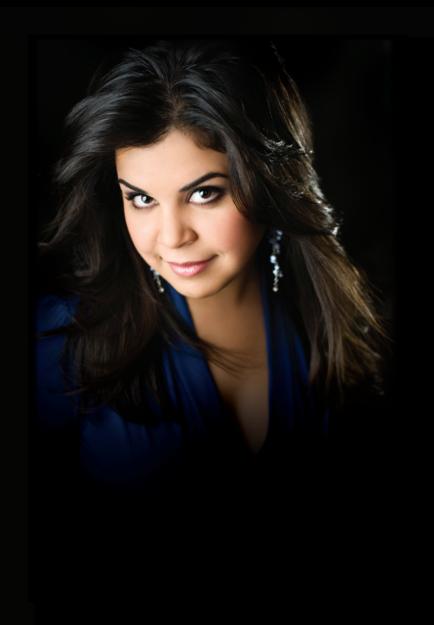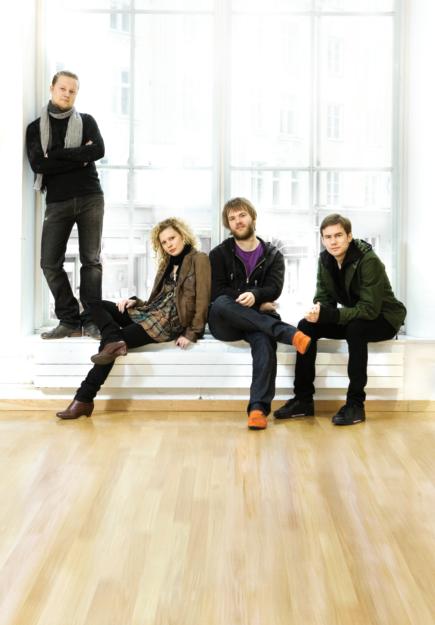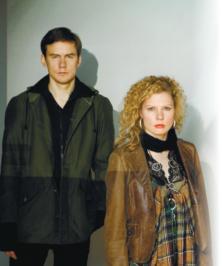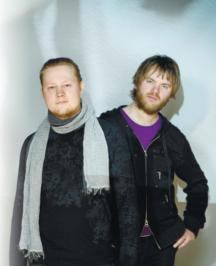ANDREA GRANT
安德莉亞.格蘭特
鋼琴 Piano
安德莉亞.格蘭特於加拿大威爾弗里 德.勞里埃大學獲取鋼琴演奏榮譽音樂 學士,繼而到西安大略大學完成鋼琴協 奏碩士課程,又在多倫多大學取得歌劇 表演文憑。格蘭特在多倫多大學歌劇部 工作,身兼加拿大艾伯塔省班芙藝術學 院「歌劇院計劃」的教員,亦參與籌 備愛爾蘭韋斯福特歌劇節。身為自由鋼 琴手,格蘭特熱衷參與各種演出,包 括獨奏、歌劇和音樂劇場;加拿大廣播 公司和英國廣播公司電台均播放過她的 獨奏。她近年參與「把歌劇帶回家」音 樂會系列,演奏由歌劇改編的鋼琴獨奏
及合奏作品。格蘭特亦參與多個北美劇 團的新作發展及製作,包括繽紛新歌劇 團、布丁女王音樂劇場、加拿大聲音流 音樂製作、卡爾加里歌劇團與及奧瑪哈 歌劇團。跟她合作的樂團有阿特里爾歌 劇團、加拿大巴羅克劇團、多倫多的馬 維殊製作公司等;她亦受過多位大師的 指導,包括馬丁.伊塞普、湯瑪士.艾 倫、卡露.凡妮斯、羅傑.維諾利斯、 伊迪斯.威恩斯和謝里爾.米恩斯。
簡歷中譯:黃家慧

Andrea Grant received her Honours Bachelor of Music in Piano Performance from Wilfrid Laurier University, and went on to complete a Master’s Degree in Collaborative Piano from the University of Western Ontario. At the University of Toronto, Grant received a Diploma in Operatic Performance. She is a full-time member of the music staff at the University of Toronto’s Opera Division, and a faculty member of the Banff Centre’s “Opera as Theatre” program, in Alberta, Canada. She is also a member of the music staff for the Wexford Festival Opera, in Ireland. Grant is active as a freelance collaborative pianist, and enjoys a variety of experiences encompassing recital, opera and musical theatre. She has been heard in recital on CBC and BBC radio, and over the past two years has given recitals of operatic music transcribed for piano and piano ensemble, under the title Opera a Casa. Grant has been involved in the development and production of several new works with various North American companies, including Tapestry New Opera Works, Queen of Puddings Music Theatre, Soundstreams Canada, Calgary Opera, and Opera Omaha. Grant also works regularly with Opera Atelier, Canada’s Baroque Theatre Company, and plays regularly for Mirvish Productions, Toronto. She has participated in masterclasses with Martin Isepp, Thomas Allen, Carol Vaness, Roger Vignoles, Edith Wiens, and Sherrill Milnes.
李斯特
Franz Liszt
S’il est un charmant gazon
如果有一片迷人的草地
If there's a lovely grassy plot
Enfant, si j’étais roi 孩子,如果我是國王
Child, if I were king
S’il est un charmant gazon
Que le ciel arrose, Où brille en toute saison
Quelque fleur éclose, Où l’on cueille à pleine main Lys, chèvre-feuille et jasmin, J’en veux faire le chemin
Où ton pied se pose!
S’il est un sein bien aimant
Dont l’honneur dispose, Dont le ferme dévouement
N’ait rien de morose, Si toujours ce noble sein
Bat pour un digne dessein, J’en veux faire le coussin
Où ton front se pose!
S’il est un rêve d’amour, Parfumé de rose, Où l’on trouve chaque jour
Quelque douce chose, Un rêve que Dieu bénit, Où l’âme à l’âme s’unit, Oh! j’en veux faire le nid
Où ton coeur se pose!
Poem by Victor Hugo (1802-1885)
Enfant, si j’étais roi, je donnerais l’empire, Et mon char, et mon sceptre, et mon peuple à genoux, Et ma couronne d’or, et mes bains de porphyre, Et mes flottes, à qui la mer ne peut suffire, Pour un regard de vous!
Si j’étais Dieu, la terre et l’air avec les ondes, Les anges, les démons courbés devant ma loi, Et le profond chaos aux entrailles fécondes, L’éternité, l’espace et les cieux et les mondes, Pour un baiser de toi!
Poem by Victor Hugo
李斯特 Franz Liszt
Comment, disaient-ils
怎麼辦?
How then?
Oh! quand je dors
噢!當我沉睡
Oh! When I Sleep
Comment, disaient-ils, Avec nos nacelles, Fuir les alguazils?
Ramez, disaient-elles.
Comment, disaient-ils, Oublier querelles, Misère et périls? Dormez, disaient-elles.
Comment, disaient-ils, Enchanter les belles Sans philtres subtils?
Aimez, disaient-elles.
Poem by Victor Hugo
Oh ! quand je dors, viens auprès de ma couche, Comme à Pétrarque apparaissait Laura, Et qu’en passant ton haleine me touche...
Soudain ma bouche
S’entr’ouvrira !
Sur mon front morne où peut-être s’achève Un songe noir qui trop longtemps dura, Que ton regard comme un astre se lève...
Soudain mon rêve
Rayonnera !
Puis sur ma lèvre où voltige une flamme, Eclair d’amour que Dieu même épura, Pose un baiser, et d’ange deviens femme...
Soudain mon âme
S’éveillera!
Poem by Victor Hugo
怎麼辦? 他們問, 以我們這艘小舟, 如何能逃過巡邏艇? 用力划!女孩們回答。
怎麼辦?他們問, 如何能忘掉爭吵、 悲傷及危機? 睡吧!女孩們回答。
怎麼辦?他們問, 如何能贏得美人心 而不用迷藥? 愛!女孩們回答。
歌詞為雨果詩句 中譯: Yen-Chiang Che
噢!當我沈睡,請來到我床邊, 如同皮特拉克出現在羅拉面前一般, 當你的氣息碰觸到我時⋯⋯ 我的雙唇
也因此而張開!
我深鎖的雙眉
將因久存夢魘的結束而解開, 你的凝視如同升起的明星, 將在我的夢中 發出光芒!
我的雙唇滾燙如火, 來自上帝的純真愛情, 獻上一吻,天使轉變成女人⋯⋯ 我的靈魂 也因而蘇醒!
歌詞為雨果詩句 中譯: Yen-Chiang Che
“How then,” asked he “By boat and tide Alguazils flee?” “Row,” she replied.
“How then,” asked he, “To set aside Strife, misery?” “Sleep,” she replied.
“How then,” asked he, “Love’s philtre denied, Win fair beauty?”
“Love,” she replied.
Translated by Faith J Cormier
Oh, when I sleep, approach my bed, as Petrarch appeared to Laura; and as you pass, touch me with your breath... at once my lips will part!
On my glum face, where perhaps a dark dream has rested for too long a time, let your gaze lift it like a star... at once my dream will be radiant!
Then on my lips, where there flits a brilliance, a flash of love that God has kept pure, place a kiss, and transform from angel into woman... at once my soul will awaken!
Translated by Emily Ezust
Robert Schumann
Ständchen
夜曲
Serenade
Komm in die stille Nacht! Liebchen, was zögerst du?
Sonne ging längst zur Ruh’, Welt schloß die Augen zu, Rings nur einzig die Liebe wacht!
Liebchen, was zögerst du?
Schon sind die Sterne hell, Schon ist der Mond zur Stell’, Eilen so schnell, so schnell! Liebchen, ach Liebchen, drum eil’ auch du.
Sonne ging längst zur Ruh!
Traust wohl dem Schimmer nicht, Der durch die Blüten bricht?
Poem by Robert Reinick (1805-1852) 舒曼
Mondnacht
月夜
Moon Night
Treu ist des Mondes Licht. Liebchen, mein Liebchen, was fürchtest du?
Welt schloß die Augen zu!
Blumen und Blütenbaum Schlummern in süßen Traum, Erde, sie atmet kaum, Liebe nur schaut dem Liebenden zu!
Einzig die Liebe wacht, Ruft dich allüberall.
Hör die Nachtigall, Hör meiner Stimme Schall, Liebchen, o komm in die stille Nacht!
Es war, als hätt’ der Himmel, Die Erde still geküßt, Daß sie im Blütenschimmer Von ihm nur träumen müßt.
Die Luft ging durch die Felder, Die Ähren wogten sacht, Es rauschten leis die Wälder, So sternklar war die Nacht.
Und meine Seele spannte Weit ihre Flügel aus, Flog durch die stillen Lande, Als flöge sie nach Haus.
Poem by Josef von Eichendorff (1788-1857)
在這寂靜的夜晚,到我這裏來啊! 親愛的,還猶豫什麼? 太陽早已功成身退, 世人都已合上眼, 我們身旁,清醒的只有愛情!
親愛的,還猶豫什麼? 星星早已閃閃發光, 月亮早已高掛天上, 連月亮也匆匆忙忙! 親愛的,親愛的,你也要快一點啊!
太陽早已功成身退! 難道以為太陽的光芒 快要從花朵那邊透進來? 那真是月亮的光, 親愛的,還怕什麼?
世人都合上眼! 花朵和茂盛的樹木 都進了甜美的夢鄉; 大地,幾乎全無氣息; 只有愛情,在看着我們這對有情人!
惟獨愛情仍然清醒, 清楚地呼喚着你。
聽夜鶯的歌聲, 聽我呼喚着你; 親愛的,寂靜的夜裏,到我這裏來啊!
歌詞為羅伯特.萊尼克 (1805-1852) 詩句
彷彿,天空
已經悄悄親吻過大地, 花兒飄落如雨, 她夢中,惟有他。
原野上,微風吹拂, 麥穗,輕輕搖動, 森林,沙沙作響,隱隱約約, 澄明的夜,閃閃發亮。
我的心靈盡展雙翼, 高飛,越過靜止的大地, 彷彿朝家裏飛去。
歌詞為艾興多夫 (1788-1857) 詩句
Come to me in the silent night! My dear, what makes you hesitate? The sun has long since gone to rest, the world has closed its eyes, around us only Love is awake!
My dear, what makes you hesitate? Already the stars are bright, Already the moon is in its place, hurrying quickly, so quickly! My dear, ah my dear, you must also therefore hurry!
The sun has long since gone to rest! Don’t you trust its shine to break soon through the blossoms? True is the moon’s light, my dear, my dear, so why are you afraid?
The world has closed its eyes! Flowers and blossoming trees slumber in sweet dreams; the earth, it hardly breathes; Only Love is looking at us lovers!
Love alone is awake, calling to you above all others.
Hear the nightingale, hear my voice’s call; my dear, o come to me in the silent night!
Translated by Emily Ezust
It was as if the sky Had quietly kissed the earth, So that in a shower of blossoms She must only dream of him.
The breeze wafted through the fields, The ears of corn waved gently, The forests rustled faintly, So sparkling clear was the night.
And my soul stretched its wings out far, Flew through the still lands, as if it were flying home.
Translated by Emily Ezust
舒曼
Robert Schumann
Er ist’s!
春來了
Spring lets its blue ribbon
Hochländisches Wiegenlied
高地人的搖籃曲
The Highland Balou
Aufträge
訊息
Messages
Frühling läßt sein blaues Band Wieder flattern durch die Lüfte; Süße, wohlbekannte Düfte Streifen ahnungsvoll das Land. Veilchen träumen schon, Wollen balde kommen.
Horch, ein Harfenton! Frühling, ja du bist’s! Dich hab ich vernommen!
Poem by Eduard Mörike (1804-1875)
Schlafe, süßer, kleiner Donald, Ebenbild des großen Ronald! Wer ihm kleinen Dieb gebar, weiß der edle Clan aufs Haar.
Schelm, hast Äuglein schwarz wie Kohlen!
Wenn du groß bist, stiehl ein Fohlen; geh' die Eb'ne ab und zu, bringe heim 'ne Carlisle Kuh!
Darfst in Niederland nicht fehlen; dort, mein Bübchen, magst du stehlen; stiehl dir Geld und stiehl dir Glück, und ins Hochland komm zurück!
English poem by Robert Burns (1759-1796)
German translation by Wilhelm Gerhard (1780-1858)
Nicht so schnelle, nicht so schnelle!
Wart ein wenig, kleine Welle! Will dir einen Auftrag geben An die Liebste mein. Wirst du ihr vorüberschweben, Grüße sie mir fein!
Sag, ich wäre mitgekommen, Auf dir selbst herabgeschwommen: Für den Gruß einen Kuß Kühn mir zu erbitten, Doch der Zeit Dringlichkeit Hätt' es nicht gelitten.
Nich so eillig! halt! erlaube, Kleine, leichtbeschwingte Taube!
春天把藍絲帶一揮 微風中,絲帶再度飄揚起來; 那甜甜的、似曾相識的幽香 帶着希望,在大地上掠過。 紫羅蘭好夢正酣, 也快到了。
聽啊!遠處——那柔和的豎琴聲! 春天,真是你啊! 那聲音就是你啊!
歌詞為莫里克 (1804-1875) 詩句
噓!小小的當奴 樣貌酷似偉大朗奴族人! 好好教導我們那淘氣的首領── 那生下我這個高地小賊的首領。 (噓!)
你的小脖子多麼可愛! 要是你長大了,就會偷一匹馬, 走過全國每個大小角落,
牽一頭卡萊爾母牛回家!
走過低地,越過邊境, 寶寶,但願你茁壯成長! 不斷侵襲低窪地的小伙子, 然後到高地的家裏來找我!
歌詞為羅伯特·伯恩斯 (1759-1796) 詩句
別忙,別忙!
等一下啊,小小的波浪! 請你為我捎個口信 向我的心上人轉達。
要是你在她身旁滑過, 情深款款地代我問候她啊! 說,我原想跟着你前往, 讓波浪你承載着我── 打過招呼,就禮尚往來 冒昧向她索吻── 但時間緊迫, 事與願違。
別急!停下啊!聽聽我的, 輕翅的小鴿子!
Spring lets its blue ribbon flutter again in the breeze; a sweet, familiar scent sweeps with promise through the land. Violets are already dreaming, and will soon arrive.
Hark! In the distance — a soft harp tone! Spring, yes it is you! It is you that I have heard!
Translated by Emily Ezust
Hee Balou, my sweet wee Donald, Picture o’ the great Clanronald!
Brawlie kens our wanton Chief What gat my young Highland thief. (Hee Balou!)
Leeze me on thy bonnie craigie! And thou live, thou’ll steal a naigie, Travel the country thro’ and thro’, and bring hame a Carlisle cow!
Thro’ the Lowlands, o’er the Border, Weel, my babie, may thou furder!
Herry the louns o’ the laigh Countrie, Syne to the Highlands hame to me!
English poem by Robert Burns (1759-1796)
Not so fast, not so fast! Wait a bit, tiny wave! I’d like to give you a message for my sweetheart. If you glide past her, greet her fondly for me! Say, I would come with you, sailing on you myself — in return for my greeting, boldly demanding a kiss — but the urgency of time would not permit it.
Not so hasty! stop! permit me, small, light-winged dove!
我有個口信 給我的心上人! 先為她送上千句問候 再另外送上一百句。
說,我原想跟你一同飛翔, 展翅飛過山脈與溪流── 打過招呼,就禮尚往來 冒昧向她索吻── 但時間緊迫, 事與願違。
別要我來迫你, 你這遲鈍的圓月! 你很清楚
我要你為我的心上人做什麼: 穿過她的小窗戶,偷偷地, 情深款款地代我問候她啊!
說,我原想爬到你身上 向她飛去──
打過招呼,就禮尚往來 冒昧向她索吻──
那是你的錯──你不耐煩了 使我──事與願違。
歌詞為萊格魯 (fl. 1850) 詩句
你從睡夢中醒來 在青草地上徘徊 整片大地上,映照着 天上奇妙的蔚藍。
只是,你已安穩入眠, 既無憂慮,亦無痛苦, 清晨開始,上天 已流下許多眼淚。
寂靜的夜晚, 不少人痛苦悲嘆, 但到了清早,你卻會以為 他們的心從來都是輕鬆開朗的。
歌詞為克納 (1786-1862) 詩句
I have a message for my sweetheart! You should give her a thousand greetings, and a hundred beyond that. Say, I would fly with you, stretching over mountain and stream — in return for my greeting, boldly demanding a kiss — but the urgency of time would not permit it.
Don’t wait for me to drive you, oh you sluggish round moon! You know well what I have commanded you to do for my sweetheart: through her little window, furtively, greet her fondly for me!
Say, I would climb on you and fly to her myself — in return for my greeting, boldly demanding a kiss; It was your fault, for your impatience would not permit me.
Translated by Emily Ezust
You have risen from sleep and are wandering through the meadow. There lies over all the land Heaven's wondrous blue.
As long as, free from cares, you've been slumbering without pain, Heaven has, since morning, shed many tears.
In silent nights, many weep from pain, and in the morning you assume their hearts are always light.
Translated by Emily Ezust
Richard Strauss
Allerseelen
萬靈節
All Soul’s Day
Poem by Hermann von Gilm (1812-1864) 理察.史特勞斯
Ich wollt ein Sträußlein binden
我應該已弄好一束小花
I would have made a bouquet
Stell auf den Tisch die duftenden Reseden, Die letzten roten Astern trag herbei, Und laß uns wieder von der Liebe reden, Wie einst im Mai.
Gib mir die Hand, daß ich sie heimlich drücke Und wenn man’s sieht, mir ist es einerlei, Gib mir nur einen deiner süßen Blicke, Wie einst im Mai.
Es blüht und duftet heut auf jedem Grabe, Ein Tag im Jahr ist ja den Toten frei, Komm an mein Herz, daß ich dich wieder habe, Wie einst im Mai.
Ich wollt ein Sträußlein binden, Da kam die dunkle Nacht, Kein Blümlein war zu finden, Sonst hätt ich dir’s gebracht.
Da flossen von den Wangen Mir Tränen in den Klee, Ein Blümlein aufgegangen Ich nun im Garten seh.
Das wollte ich dir brechen Wohl in dem dunklen Klee, Doch fing es an zu sprechen: “Ach, tue mir nicht weh!
Sei freundlich im Herzen, Betracht dein eigen Leid, Und lasse mich in Schmerzen Nicht sterben vor der Zeit!”
Und hätt’s nicht so gesprochen, Im Garten ganz allein, So hätt ich dir’s gebrochen, Nun aber darf’s nicht sein.
Mein Schatz ist ausgeblieben, Ich bin so ganz allein.
Im Lieben wohnt Betrüben, Und kann nicht anders sein.
Text by Clemens Brentano (1778-1842)
Richard Strauss
Zueignung
獻詞
Dedication
Cäcilie
潔茜莉
Cecily
Ja, du weißt es, teure Seele, Daß ich fern von dir mich quäle, Liebe macht die Herzen krank, Habe Dank.
Einst hielt ich, der Freiheit Zecher, Hoch den Amethysten-Becher, Und du segnetest den Trank, Habe Dank.
Und beschworst darin die Bösen, Bis ich, was ich nie gewesen, Heilig, heilig an’s Herz dir sank, Habe Dank.
Poem by Hermann von Gilm
Wenn du es wüßtest, Was träumen heißt von brennenden Küssen, Von Wandern und Ruhen mit der Geliebten, Aug in Auge, Und kosend und plaudernd, Wenn du es wüßtest, Du neigtest dein Herz!
Wenn du es wüßtest, Was bangen heißt in einsamen Nächten, Umschauert vom Sturm, da niemand tröstet Milden Mundes die kampfmüde Seele, Wenn du es wüßtest, Du kämest zu mir.
Wenn du es wüßtest, Was leben heißt, umhaucht von der Gottheit Weltschaffendem Atem, Zu schweben empor, lichtgetragen, Zu seligen Höhn, Wenn du es wüßtest, Du lebtest mit mir!
Poem by Heinrich Hart (1855-1906)
親愛的心靈,你知道 沒有你我多麼痛苦, 愛情令人心煩意亂, 當感謝。
曾經,我渴飲自由, 高舉紫水晶的大杯, 杯中物就得到你的祝福, 當感謝。
你趕走了裏面的罪惡, 直至我──史無前例的── 快快樂樂地沉醉在你心窩, 當感謝。
歌詞為赫曼.馮.吉姆詩句
要是你知道 夢想得到火熱的吻、 夢想與摯愛流浪與歇息、 夢想四目交投、
親熱地摟抱着聊天是什麼滋味── 要是你知道的話, 就會為我傾心!
要是你知道, 夜裏孤單一人多麼可怕、 狂風暴雨時沒人安慰 沒有人用溫柔的聲線,撫慰你厭倦爭鬥的 心靈──
要是你知道的話, 就會來到我身邊。
要是你知道, 生活在上帝 創造世界的氣息當中、 這如燕的身軀乘着光線, 飄浮到快樂的高處── 要是你知道的話, 就會跟我一起生活!
歌詞為哈特 (1855-1906) 詩句
除特別註明,歌詞中譯:鄭曉彤
Yes, you know it, dearest soul, How I suffer far from you, Love makes the heart sick, Have thanks.
Once I, drinker of freedom, Held high the amethyst beaker, And you blessed the drink, Have thanks.
And you exorcised the evils in it, Until I, as I had never been before, Blessed, blessed sank upon your heart, Have thanks.
Translated by Lawrence Snyder and Rebecca Plack
If you only knew what it’s like to dream of burning kisses, of wandering and resting with one’s beloved, eye turned to eye, and cuddling and chatting — if you only knew, you would incline your heart to me!
If you only knew what it’s like to feel dread on lonely nights, surrounded by a raging storm, while no one comforts with a mild voice your struggle-weary soul — if you only knew, you would come to me.
If you only knew what it’s like to live, surrounded by God’s world-creating breath, to float up, carried by the light, to blessed heights — if you only knew, then you would live with me!
Translated by Emily Ezust
中提琴 Viola
阿特.基佩萊納 Atte Kilpeläinen
小提琴 Violin
敏娜.潘素拉 Minna Pensola
小提琴 Violin
安提.蒂卡南 Antti Tikkanen
大提琴 Cello
托瑪斯.杜斯約伯卡 Tomas Djupsjöbacka
META4 四重奏
Meta4 四重奏於 2001 年組成,是國際
知名的芬蘭弦樂四重奏。其團員師從哈 圖.拜爾利和約翰.邁斯爾,並於歐洲 室樂學院進修。
2004 年在莫斯科舉行的蕭斯達高維契 國際四重奏大賽中,Meta4四重奏奪得 冠軍,並獲頒蕭斯達高維契作品最佳 演繹獎; 2007 年樂團在維也納海頓國 際室樂比賽折桂,同年獲芬蘭藝術年 獎;樂團還被英國廣播公司選為 2008 至2010年的新世代藝術家。
Meta4四重奏常於各大音樂重鎮演出, 包括維也納的莫扎特廳、倫敦威格摩爾 音樂廳、馬德里國家音樂廳,以及紐約 卡內基音樂廳;樂團現為庫莫室樂節的 駐節四重奏,同時是奧倫薩洛音樂節的 藝術總監。
2009 年 5 月樂團由 Hänssler Classics 發 行了一張海頓專輯。同年,樂團還受邀 於維也納、巴黎、倫敦、聖彼得堡和布 宜諾斯艾利斯等地獻藝。
樂團用琴講究,敏娜.潘素拉演奏用 的是 1770 年的貝洛西歐小提琴,為史 斯瑪地區合作銀行所擁有;托瑪斯.杜 斯約伯卡的大提琴由製琴家卡洛.吉 塞浦.塔斯托里製造,芬蘭文化基金借 出;另外兩件樂器都由波猶拉銀行藝術 基金借出,包括安提.蒂卡南的 1702 年史特拉第瓦里小提琴和阿特.基佩萊 納的1737年圭達圖斯中提琴。
中譯:黃家慧
Meta4, formed in 2001, is one of the most internationally successful Finnish string quartets. Its members studied under Hatto Beyerle and Johannes Meissl, and also attended the European Chamber Music Academy.
In 2004 Meta4 won first prize and a special prize for best Shostakovich interpretation at the International Shostakovich Quartet Competition in Moscow. The quartet enjoyed continued success in 2007, when they won first prize in the International Joseph Haydn Chamber Music Competition in Vienna. Later that year Meta4 was awarded the annual Finland Prize, and was selected by the BBC as a New Generation Artist for 2008-2010.
The quartet performs regularly in key music capitals and concert halls around the world including Vienna (Mozart Saal), London (Wigmore Hall), Madrid (Auditorio Nacional), and New York (Carnegie Hall). Meta4 is the quartet-in-residence of the Kuhmo Chamber Music Festival and also serves as Artistic Director of the Oulunsalo Music Festival.
In May 2009, Hänssler Classics released a Haydn recording by Meta4, and the quartet was invited to perform in Vienna, Paris, London, St Petersburg, and Buenos Aires.
The quartet includes Minna Pensola, who plays a 1770 Bellosio violin owned by the Local Cooperative Bank of Sysmä; Tomas Djupsjöbacka who plays a 1718 cello made by Carlo Giuseppe Testore and owned by the Finnish Cultural Foundation; Antti Tikkanen who plays a 1702 Stradivarius violin and Atte Kilpeläinen who plays a 1737 Guidantus viola, both instruments on loan from the Pohjola Bank Art Foundation.
史曼諾夫斯基 第二弦樂四重奏,作品 56
史曼諾夫斯基孜孜不倦地鑽研民間音 樂,與巴托克不相伯仲。諷刺的是,他 的第二四重奏卻在一次由美國的音樂 協會贊助的比賽中輸給了巴托克。民間 音樂是這首四重奏的重要元素,史曼諾
夫斯基運用起來卻像是自己獨特的音樂 語言。這首三樂章的四重奏作於 1927 年,十年後,這位遊歷豐富的作曲家因 肺結核逝世。
開篇樂章延續了史曼諾夫斯基早年狂想 式、注重感覺的音樂風格。流動輕柔的 第一主題滲透大部份樂章結構,最後漸 漸消散,飄渺如夜曲。但在接下來的 兩個樂章中,音樂變得強而有力,是採 用了波蘭民間音樂元素。史曼諾夫斯基 生於波蘭貴族地主家庭,上世紀二十 年代,他在研習波蘭塔特拉高地(屬於 今天斯洛伐克與波蘭之間的喀爾巴阡山 脈)音樂的時候,再次從家鄉文化中獲 得新靈感。
全套作品都要求演出者有極強的演奏技 巧和表現力。第二樂章〈諧謔曲〉,洋 溢着強健有力的律動,亦有令人眼花繚 亂的色彩效果。史曼諾夫斯基對弦樂的 處理突破常規,這種大膽的嘗試賦予了 樂曲勃勃生機。第三樂章是雙重賦格, 不循規蹈矩,不拘泥於學院教條。其中 的對位不僅包括了動機樂思,各個織體 也互相較量,表現出明顯的壓迫感。音 樂中的能量在最後階段一湧而出,再次 匯集;四位樂師同心協力,將終樂章推 向高潮。
Karol
Szymanowski
String Quartet No 2, Op 56
Karol Szymanowski’s passionate, in-depth studies of folk music frequently invite comparisons with Béla Bartók. Ironically, when he submitted this second of his two string quartets to a competition sponsored by an American music society, Szymanowski lost the prize to Bartók. Folk influences are integral to this piece, but Szymanowski employs them as part of a language entirely his own. This quartet, in three movements, dates from 1927, ten years before the welltravelled composer’s death from tuberculosis.
The rhapsodic, sensual quality of Szymanowski’s earlier music still has a presence in the opening movement — as we hear in the floating, ethereal first theme that pervades much of its structure and eventually dissolves, as vaporous as night music. However, a harsher and more vigorous sound, drawing on Polish folk elements, comes to the fore in the other two movements. In the 1920s, Szymanowski, who was born into the Polish landed gentry, found renewed inspiration in his native culture when he studied the music of the Tatra highlands (part of the Carpathian mountain range, between present-day Slovakia and Poland).
The Second Quartet as a whole demands tremendous expressive virtuosity from the ensemble. The middle movement is a scherzo that pulsates with muscularity while calling on a dazzling range of colouristic effects. Here Szymanowski treats the strings in unpredictable ways, but the result conveys vivid personality along with experimental boldness. The last movement, structured as a double fugue, suggests no trace of the academic or proper. Szymanowski’s counterpoint involves more than motivic ideas. Textures are also played off each other with a palpable sense of urgency. The musical energy pools and regathers in the final stages, when the players coordinate for a final, decisive climax.
維內利.波赫奧拉 《橙色作品》
這是我為純弦樂四重奏而寫的首批作品 之一。之前,弦樂四重奏也在不同的編 制下出現在我的多部作品中,或加入大 型爵士樂隊,或與小號組成五重奏。很 榮幸獲 Meta4四重奏邀請為他們作曲, 他們是我非常欣賞的樂團之一。創作時 我力求使作品既有我的特色,也有他們 的風格。本曲的創作靈感來自多方面, 我運用自己在旋律及節奏雙方面的音樂 背景譜成了這個曲調。
Verneri Pohjola Orange Piece
This piece is one of my first compositions written solely for a string quartet. Previously, my work has included string quartets in many compositions and many different settings, for example as part of a larger jazz group or as part of a quintet with a trumpet as soloist. I was very flattered when Meta4 contacted me and asked me to write a composition for them. Meta4 is one of my favourite ensembles and I have tried my best to make this piece sound both like me and them. My inspiration for writing this music comes from many different sources, and in this tune particularly, I have tried to exploit both the melodic and rhythmic sides of my musical background.
簡歷 Biography
維內利.波赫奧拉生於音樂世家,父親是低音大提琴手碧克.波赫奧拉,多位親戚亦是音樂家。作 為小號手和作曲家,他的作品同家人一樣,透着濃郁的芬蘭特徵。
波赫奧拉是年輕先驅組合依美利基四重奏的成員,這譽滿芬蘭的爵士樂組合已推出兩張專輯,實力 蒸蒸日上。2006年末,四重奏在紐約林肯中心舉行了一場意義重大的音樂會。波赫奧拉除了與依美 利基四重奏送上悠揚樂韻,還是演繹電音爵士樂的「典範」樂隊中的骨幹份子。
Like his father, bassist Pekka Pohjola, and other musicians of the Pohjola family, trumpeter and composer Verneri Pohjola makes music in a way that can only be described as “Finnish”. Pohjola is a member of the Ilmiliekki Quartet, a truly trailblazing young group that has become Finland’s most renowned jazz export. With two albums under their belt, the team has gone from strength to strength. A particularly important concert was staged at the Lincoln Center in New York City in late 2006. The acoustic meanderings of Ilmiliekki aside, Pohjola is also an integral part of the nu jazz sound of jazz band Quintessence and its various offshoots.
西貝流士
D小調弦樂四重奏,作品 56,
《親密聲音》
西貝流士四十多歲時所經歷的不順利 對其多部作品都產生了影響,包括這 首作於 1908 年末至 1909 年 4 月間的四 重奏。他喉部的持續不適被認為是癌 症,使他極為焦慮(再加上醫生令他 戒除鍾愛的煙酒)。緊隨他的近作第三 交響曲,西貝流士在 1890 年後首次重 拾弦樂四重奏的創作。這首五樂章的 D 小調作品是他成熟時期惟一結構完整的 四重奏( 1922 年他譜寫了《歡慶的行 板》,一首在大型活動時演奏的獨樂章 四重奏)。
將藝術家的生活境況與他的音樂表達聯 繫起來時一定要謹慎。西貝流士也正在 音樂上的危局尋找出路——當時他從 前兩部甚具份量的後浪漫主義交響曲, 墮進了於 1911 年創作的第四交響曲的 可怕深淵。也許正是四重奏較為輕巧的 結構使作曲家可以理清自己的思路。四 重奏的前兩個樂章聯繫極為緊密,在結 構上進行了新的嘗試,而西貝流士在其 後的交響曲中延續了此種風格(其中的 〈極快板 〉重現了首樂章的樂思)。
同時,西貝流士的確將個人情感結合在 音樂裏,他把懺悔似的〈慢板〉作為整 部作品的重心。事實上,四重奏的副標 題《親密聲音》,是西貝流士用鉛筆註 在〈慢板〉開頭一連串脫俗靜謐的和 弦譜間的。樂章開場的樂句低沉輕柔, 好比夜間靜放的花朵,充份透露了親 密之感。最後兩個樂章形成精采的對 比——陰鬱宿命的〈小快板〉之後, 是滲透出悲劇氣息,同時堅決對抗這種
Jean Sibelius String Quartet in D minor, Op 56, Voces Intimae
The turmoil experienced by Jean Sibelius in his mid-40s seems to have left its mark on several of his works, including the quartet that he composed between late-1908 and April 1909. A persistent irritation he had complained of in his throat was thought to be cancer, causing great anxiety (compounded by the fact that doctors ordered him to abstain from alcohol and the cigars he cherished). In the wake of his recent Third Symphony, Sibelius returned to the string quartet genre for the first time since 1890. This fivemovement work, in D minor, is the only example of a full-scale string quartet from the composer’s maturity (In 1922 he crafted the Andante festivo, a single-movement occasional piece for quartet).
Caution is al ways called for when suggesting parallels between an artist’s biographical circumstances and the musical expression of a particular piece. Sibelius was also working his way through a musical crisis—one that led from the powerful post-romantic rhetoric of his first two symphonies to the terrifying abyss of the Fourth Symphony of 1911. Perhaps the leaner medium of the string quartet offered a way to clarify some of his thinking. The seamless link between the first and second movements is part of an ongoing process of experimentation with form that Sibelius would continue in his later symphonies (here, the brief Vivace reconsiders ideas from the opening movement).
At the same time, Sibelius does suggest a connection with his emotional life by making a confessional Adagio the gravitational centre of the whole work. Indeed, the subtitle Voces intimae (“Intimate Voices”) is a phrase Sibelius penciled into the score over a series of otherworldly, hushed chords heard early in the Adagio . This movement fulfills the promise of intimacy
斯巴斯蒂安.韋蘭特
費雷堡巴羅克樂團音樂會獨奏
SEBASTIAN WIENAND
featured soloist of the Freiburg Baroque Orchestra Concert 古鋼琴 Fortepiano
1984 年出生的韋蘭特,五歲開始學鋼 琴, 2004 年底,他開始在瑞士巴塞爾
古樂學院研習古代鍵盤樂器,在博堤赫 的指導下,於 2008年 6月以驕人的成績 完成古鍵琴課程。
韋蘭特現在全心投入,跟托比安納利學 習古鋼琴,並由路斯教授即興演奏。他 以獨奏或與室樂團合奏的演出,在多個 國內外比賽奪冠,計有德國青年音樂家 大賽、柏林施坦威大賽、德國音樂家大 賽、荷蘭的查理斯.賀南國際室樂比賽
及比利時的古樂大賽;自 2007 年起, 他多次出任雅各斯的音樂助理,協助歌 劇演出,並参與柏林古樂學會和費雷堡
巴羅克樂團的演出。
中譯:黃家慧
雷奈.雅各斯與費雷堡巴羅克樂團
René Jacobs and the Freiburg Baroque Orchestra
2010年3月13日(星期六)
曲目
海頓
降 E大調第九十一交響曲
莫扎特
F大調第十九鋼琴協奏曲, K459
古鋼琴 斯巴斯蒂安.韋蘭特
莫扎特
D大調第三十八交響曲, K504,《布拉格》
Sebastian Wienand, born in 1984, received his first piano lesson when he was five years old. In late 2004, he began studying historical keyboard instruments at the Schola Cantorum Basiliensis in Basel, Switzerland. In June 2008, he completed his harpsichord studies under Jörg-Andreas Bötticher with top marks.
Wienand now devotes himself to studying fortepiano with Edoardo Torbianelli and improvisation with Rudolf Lutz. He has come in first in numerous competitions — both as a soloist and as a member of various chamber music ensembles — including Germany’s Jugend musiziert, the Steinway Competition in Berlin, and the Tonkünstlerwettbewerb Deutschland; the Netherlands’ Charles Hennen Concours; and Belgium’s Musica Antiqua in Bruges. Since 2007, he has regularly served as Musical Assistant to René Jacobs in opera projects, and played with the Academy for Ancient Music Berlin, and the Freiburg Baroque Orchestra.
13 March 2010 (Saturday) Programme
Joseph Haydn Symphony No 91 in E flat
Wolfgang Amadeus Mozart Piano Concerto No 19 in F, K459
Fortepiano Sebastian Wienand
Wolfgang Amadeus Mozart Symphony No 38 in D, K504, Prague








